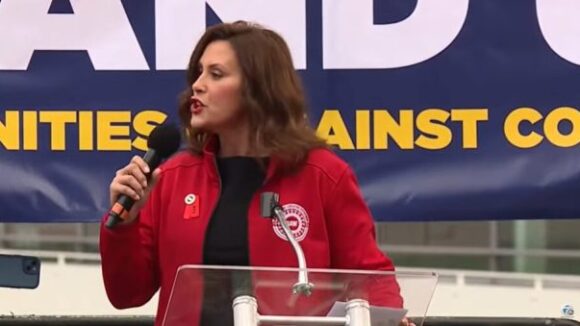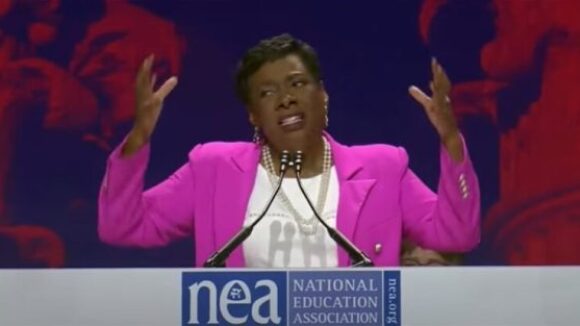Tyranny Triumphs in the Great Lakes State
Ignoring ample evidence of forced unionism’s unfairness and its damaging impact on jobs and incomes, Big Labor Michigan Gov. Gretchen Whitmer signed Right to Work destruction in 2023.
But Federal Forced-Unionization Scheme Is Bound to Reemerge Soon
It is growing very clear that Big Labor politicians know the American people do not support their scheme to establish a new federal mandate imposing union “exclusive representation” (monopoly bargaining) over state and local police, firefighters, and other public-safety employees nationwide. Jus t be fore the U.S. House adjourned last month, forced-unionism cheerleader Speaker Nancy Pelosi (D-Calif.) and her cohorts plotted to sneak this legislation through their chamber while attracting as little public attention as possible.
Behind the scenes, Ms. Pelosi, Big Labor Congressman Dale Kildee (D-Mich.), and others worked on a plan to tack Mr. Kildee’s House version of the Police/Fire Monopoly-Bargaining Bill (H.R.413) onto H.R.3326, the Fiscal Year (FY) 2010 Department of Defense Appropriations Bill.
And Ms. Pelosi, Mr. Kildee et al probably would have succeeded in securing a House rubber-stamp for a huge expansion of union bosses’ monopoly privileges without facing major resistance – but for the efforts of the National Right to Work Committee and its allies on Capitol Hill.
Committee Staff Alerted Leaders of Allied Groups
On December 14, within just hours of learning from a key Capitol Hill source that Big Labor House leaders were preparing to bring up H.R.413 as an amendment to H.R.3326, Committee legislative officers began sending faxes and e-mails and making personal visits to key Capitol Hill offices.
Right to Work staff also alerted leaders of several organizations representing the interests of local governments and public-safety departments, such as the National Sheriffs’ Association (NSA), that is also opposed to H.R.413 and its U.S. Senate counterpart, S.1611.
House members from key swing districts who were already edgy as a result of the intense public controversy over ObamaCare thus began receiving calls and e-mails from an array of groups urging them to resist all efforts to attach the monopoly-bargaining bill to the defense spending measure.
Moreover, congressmen and their staff members certainly knew from previous showdowns over forced unionism legislation that, if H.R.3326 emerged with a monopoly-bargaining amendment, their offices would quickly be flooded with calls from Right to Work members mobilized by the Committee’s phone operation.
And on Wednesday, December 16, it became clear that Speaker Pelosi and co. had decided to heed, for the moment, concerned congressmen when H.R.3326 was formally introduced without the public-safety monopoly bargaining provision.
Vast Majority of Americans Reject Monopoly Bargaining
Of course, Big Labor House leaders are virtually certain to try again early this year to smuggle H.R.413 through their chamber. And there are still several pending FY 2010 appropriations bills to which this destructive measure could be attached. H.R.413 and the nearly identical S.1611 would force countless policemen, firefighters and EMT’s to accept as their monopoly-bargaining agent a union they personally never voted for, and want nothing to do with.
Moreover, H.R.413 and S.1611 do NOT protect the Right to Work without being forced to pay union dues or fees either of the public-safety employees upon whom Congress is imposing a union monopoly, or of the public-safety employees who are already subject to one.
“Americans overwhelmingly oppose monopoly bargaining, period,” noted Committee President Mark Mix. “The public certainly has no interest in backing legislation designed to help Big Labor grab monopoly-bargaining privileges over hundreds of thousands of additional employees.”
Mr. Mix cited a recent scientific nationwide survey conducted by veteran pollster Del Ali and his firm Research 2000. The poll found that 81% of Americans who regularly vote in statewide elections believe that employees in unionized businesses should retain the right to bargain for themselves. Just 17% of regular voters believe employees should not have that right, while 2% are unsure.
“Forcing union nonmembers to accept public-safety union officials as their monopoly-bargaining agent is what H.R.413 and S.1611 are all about,” explained Mr. Mix. “Any state law or local ordinance authorizing public-safety union bosses to bargain on behalf of their members only would get tossed in the scrapheap if either measure became law.”
And government union bosses actually see this legislation as just a first step toward enactment of a federal mandate corralling state and local employees of all kinds into unions. “H.R.413 simply can’t withstand public scrutiny. And Nancy Pelosi knows it.”
Big Labor-Appeasing West Virginia GOP Congresswoman ‘Should Heed Her Own Mayor’
Mr. Mix continued: “Federalizing union monopoly control over public safety employees would be ill-advised at any time, but at a time when taxes are already poised to skyrocket and cities and towns across America are already facing their worst fiscal crisis in decades, enactment of H.R.413 would be incredibly reckless.”
Pervasive public-sector union monopoly bargaining helps government union bosses build up giant political machines, which in most cases are fueled by workers’ compulsory union dues and fees. “
Government union officials use their electoral machines to bankroll Tax-and-Spend state legislative and executive politicians. And the onerous taxes such politicians foist on families and businesses sharply suppress job and income growth.
“Responsible local elected officials across the country have recognized the danger and are urging Congress to defeat H.R.413 and S.1611.”
For example, just this past November, Danny Jones, the mayor of Charleston, W.Va., publicly expressed his concern that this legislation could “bankrupt” his city. In an interview with Charleston’s Daily Mail, Mr. Jones starkly predicted of H.R.413/S.1611: “It’s going to change things. The relationship [between the city and the police union] will become adversarial. “. . . If you look around the states, the most unionized states are the ones that are most broke.”
“Unfortunately,” noted Mr. Mix, virtually every Democrat in Congress and dozens of Republicans are choosing to back the Police/Fire Monopoly- Bargaining Bill in spite of what concerned mayors, city council members, and public-safety officials have to say. “For example, West Virginia GOP Congresswoman Shelley Moore Capito, who resides in Charleston when she isn’t in Washington, is a cosponsor of the very bill her hometown mayor charges could bankrupt their city.”
Ms. Capito should heed her own mayor and withdraw her support for H.R.413 immediately.”
Right to Work Committee And Its Members Will Keep Turning up the Heat
“Enactment of H.R.413 or S.1611 would be disastrous, not just for independent-minded public-safety officers and Right to Work advocates, but also for taxpayers and citizens who depend on their local police and fire departments,” Mr. Mix continued. “That’s why the National Right to Work Committee and its members can’t afford to rest on our laurels for a minute. We will keep turning up the heat in preparation for the next Capitol Hill showdown over H.R.413/S.1611.
“I urge all Right to Work members to maintain and expand their support, both lobbying and financial, for our campaign. Working together, we can stop the federalization of public-safety monopoly bargaining in 2010.”

Ignoring ample evidence of forced unionism’s unfairness and its damaging impact on jobs and incomes, Big Labor Michigan Gov. Gretchen Whitmer signed Right to Work destruction in 2023.

Largely thanks to the Right to Work attorney-won U.S. Supreme Court decision in Janus v. AFSCME, union bosses like NEA President Becky Pringle are no longer able to block virtually all meaningful education policy reforms.

Avelo employee Kim Howard believes all the firm’s flight attendants should get to vote on continued AFA rule. Credit: WTNH-TV (ABC,…